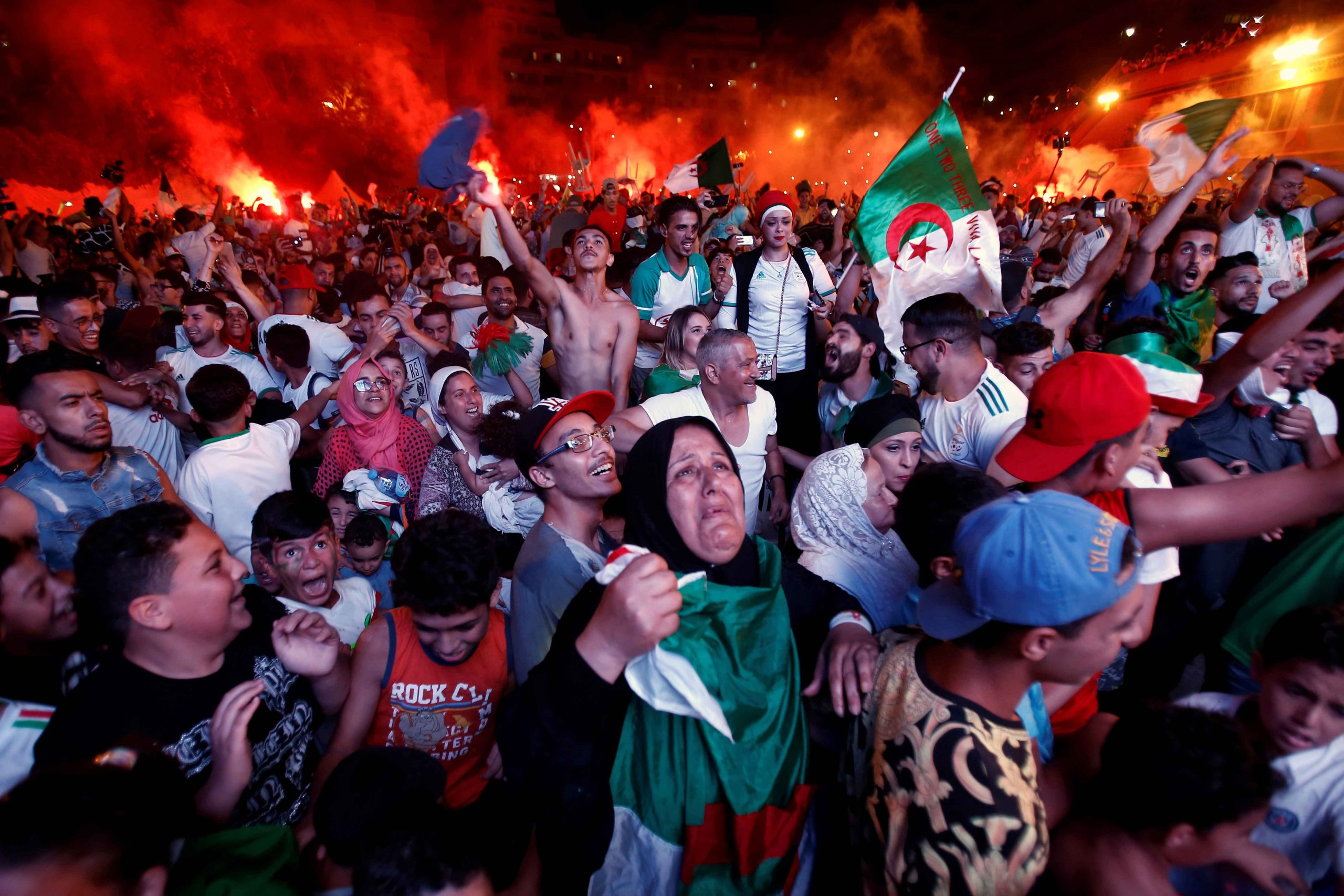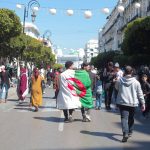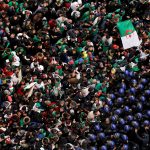What does an Afcon final mean to Algeria?
In the year Algerians toppled their long-standing dictator, the national football team is 90 minutes from Africa Cup of Nations glory. The key question is what this means for Algerians.
Author:
19 July 2019

Yemma, my grandmother, whom we call mother in an Algerian dialect because that’s what my mother called her, died on Sunday 14 July, moments before Riyad Mahrez scored from a free kick in the 95th minute to send Algeria to the final of the Africa Cup of Nations (Afcon).
My father video-called me during coach Djamel Belmadi’s post-match press conference to tell me face to face. “Okay. Allah yerhamha (May God have mercy on her),” I replied.
The bubbly feeling I got in the middle of my sternum after the important win quickly died down. I understood the historic achievement of making the final for the first time in 29 years, but I did not feel it. I was simultaneously happy for my country and sad for my mother, who was now an orphan at 60 years of age.
After the press conference, a few colleagues solicited me to ask the one question that I would hear repeatedly in the build-up to this final. “What exactly does this victory mean to Algerians?”
I should have responded by mentioning that the first Algerian I broke the news to asked me if Yemma’s death was from cardiac arrest while watching the match. That was a fair question, a 19-year-old Algerian from Bouira, 100km east of Algiers, died of a heart attack after Mahrez scored.
National team as an avatar
It is fitting that it was the Algiers-born existentialist Albert Camus who once said, “What I know about morality and the duty of man, I owe to football.”
In 1958, 13 Algerian players based in France left their clubs without giving notice. They travelled to Tunis to create the first Algerian national team, four years before Algeria gained independence, forever fixing the Algerian national team as the sporting avatar of the country.
In an interview with television network beIN Sports before the knockout stage, Belmadi spoke about the importance of the national team as an institution, affirming Camus’ words.
“For me, the national team and the country are the same,” he said in a rare, sit-down interview in Egypt. “We represent a country with a glorious past, which is even an example for other countries. Our revolution and independence, it’s not something you find anywhere. They are anchored in all of us as Algerians, sometimes even unconsciously. In sport, the notion of sacrifice and solidarity are essential.
“Our modus operandi is to play with a lot of heart, ambition, effort and solidarity. These are the ingredients so that all of our supporters identify themselves in this team. That is what they want to see.”
Related article:
On the pitch, it is clear what playing for Algeria means to the players. Onlookers have watched with fascination as this squad has scrapped, laughed and cried its way to the final.
When striker Baghdad Bounedjah missed a penalty against Ivory Coast, he spent 40 minutes sobbing, nearly collapsing with exhaustion at full time. In the mixed zone, he apologised to journalists, “If we had lost, it would have been my fault.”
Youcef Atal and his coach were also in tears during the penalty shootout that followed. When Sofiane Feghouli scored in the quarterfinal, he screamed so intensely I feared the veins in his neck would pop.
A team reborn alongside the Hirak
Since 22 February, Algerians have taken to the streets in widespread democratic protests. Young, politically conscious and competent members of society came together and bucked the perception that Algerians were apathetic or incapable of compromising.
“Of course we are paying attention to what is happening,” Yacine Brahimi said before the tournament.
For many Algerians on social media, this team embodies what is right about the new generation of Algerians taking to the street.
“We were very happy to see that everything was peaceful and calm. It’s extraordinary,” The Porto midfielder told news network France24. “With the latest events [Hirak], we want to give even more and have a great Afcon. We feel like the people are pushing us.”
Related article:
Though it may be unfair to tie Belmadi’s predecessor, Rabah Madjer, to an authoritative regime, the 1987 Africa Footballer of the Year was representative of the old way of doing things in Algeria.
It is an open secret that Madjer was not appointed by the appropriate governing body. The Algerian Ministry of Youth and Sports wedged him in the job, despite him being underqualified. He did not have his coaching badges, yet he often lectured his players about how great his past accomplishments were.
After training sessions, as his players gathered to take free kicks, he would walk over and “teach” them how he used to take them at Porto 40 years ago.
Unlike Madjer, Belmadi is young, competent and demanding. He is perfectly representative of this new Algerian generation, spurring the country towards what some are calling a second republic.
Related article:
One story emerged from Algeria’s pre-tournament training camp in Qatar. Departure from the team hotel was scheduled for 6pm. At the appointed time, Riyad Mahrez was the only player not on the team bus. Belmadi told the bus driver to close the door and leave. The driver hesitated. Belmadi insisted. The bus left and when Mahrez emerged, he had to take a car to the stadium.
It is alleged that Belmadi reprimanded Mahrez on being a responsible captain who leads on and off the pitch. The Algerian talisman reacted with strong performances on the pitch. It was his goal that took the Desert Foxes to the final with a 2-1 win over Nigeria. Mahrez also had a hand in the opening goal. It was his cross that Super Eagles centreback William Troost-Ekong directed into his own net.
Whose victory is this?
Since former Algerian president Abdelaziz Bouteflika was deposed in early April, protesters have been locked in a stalemate between the army and the interim government that Bouteflika named before stepping down. The protesters’ main targets are interim Prime Minister Noureddine Bedoui and interim President Abdelkader Bensalah.
Protesters refuse to proceed to the ballot box and appoint a president until key members of the former regime step down, a measure that the army does not find “realistic”. As a result, the allotted time mentioned in article 94 of the Constitution, concerning vacating the presidency, has passed and the country is locked in a constitutional crisis.
Related article:
In recent months, the authorities have cracked down on the Hirak and imprisoned dissenters or those daring enough to criticise the army chief, Ahmed Gaid Salah, including a supporter who held a political sign in Egypt.
As the regime has successfully restricted the number of protesters, they are also involving themselves in Afcon. Interim Minister of Youth and Sports Raouf Bernaoui has made the trip to Egypt several times. His department subsidised thousands of flights and match tickets for supporters.
The military also got in on the act, authorising nine military planes for the transport of supporters to Cairo.
“Following the deserved qualification of the national team at the semifinals of the Africa Cup of Nations, the high command of the national army has decided to – in coordination with the prime minister – make six [which turned to nine] military aircraft available to 600 supporters to support and encourage the national team.”
But before this “aerial bridge” of supporters connects Algiers to Cairo, and before Algeria and Senegal tussle at Cairo International Stadium, the Hirak’s 22nd Friday protest will take place – and with it the battle to prove to whom this team really belongs.




